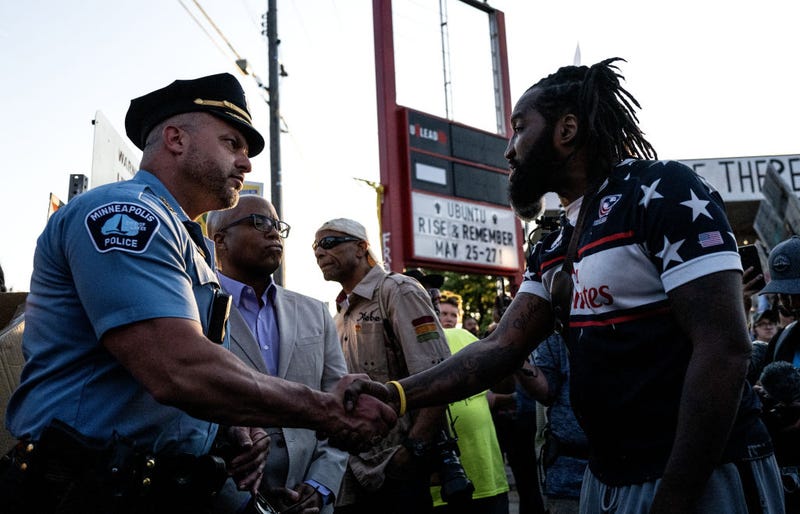
The Minneapolis City Council is continuing to meet behind closed doors on Monday, going line-by-line over an agreement for a federal consent decree that would mandate reforms within the Minneapolis Police Department.
The agreement needs to be approved by the Council before it can be filed in federal court which is expected to happen at some point on Monday afternoon.
"This is utterly necessary," says Michelle Gross with the citizens group Communities United Against Police Brutality. "Our city, you will recall, was the epicenter of activity around police accountability five years ago and that was because of the murder of George Floyd. But George Floyd was not the only person killed by the Minneapolis police, not by a long shot."
Advocates hope to pass the decree before Donald Trump's return to the White House on January 20. The president-elect has been critical of the consent decree calling it a "war on police." A press conference with Department of Justice and City of Minneapolis officials is planned for 4:30 Monday afternoon.
The agreement with the federal government comes in response to that murder of George Floyd and it would require major reforms within the city's police department under long-term court supervision.
Minneapolis Police Chief Brian O’Hara knows plenty about consent decrees. Before O'Hara came to Minneapolis as chief, he was in Newark, New Jersey where that city has been under a consent decree since 2016.
In a message to police rank-and-file, O’Hara said he’ll remain committed to improving the department through this process.
“When we focus on the right priorities, supporting one another, engaging with our community and remaining committed to our shared values, we can and we will navigate this process successfully and emerge stronger,” O’Hara said.
"He's going see what's practical, what isn't practical," says WCCO Radio Political Analyst Blois Olson. "But again, this is not just a legal document. This is a political document because stakeholders that are critical of the police department are going to hold this out. And if they don't think they got enough, they're going to be the squeaky wheel that tries to muck this up even more."
The agreement, known as a consent decree, has been under negotiation since the Department of Justice issued a scathing critique of the city's police in June 2023, alleging that they systematically discriminated against racial minorities, violated constitutional rights and disregarded the safety of people in custody for years before Floyd, a Black man, was killed by a white Minneapolis officer in 2020. Floyd's death prompted a national reckoning with police brutality and racism.
The Justice Department report was the result of a sweeping two-year investigation that confirmed many citizen complaints about police conduct. The investigation found that Minneapolis officers used excessive force, including “unjustified deadly force,” and violated the rights of people engaged in constitutionally protected speech.
As a result, the city and police department agreed to negotiate a deal with the federal agency to require changes overseen by an independent monitor and approved by a federal judge. Minneapolis Mayor Jacob Frey, several council members and police accountability activists all welcomed the prospect at the time as a move toward healing the city.
Frey called a special City Council meeting for Monday “for the purpose of receiving a briefing on the litigation matter of U.S. Department of Justice v. City of Minneapolis and Minneapolis Police Department, including resolution possibilities.” After a closed-door discussion that began Monday morning, the council was expected to reconvene in public in the afternoon for a vote.
During his first administration, President-elect Donald Trump was critical of consent decrees as anti-police. Finalizing the Minneapolis agreement before he returns to office Jan. 20 would make it harder for him to undercut the deal, because changes would require court approval.
A state court judge in 2023 approved a similar agreement between Minneapolis and the Minnesota Department of Human Rights after the state agency issued its own blistering report in 2022. The state investigation found that the city's police had engaged in a pattern of race discrimination for at least a decade.
The Justice Department has opened 12 similar investigations of state and local law enforcement agencies since April 2021, many in response to high-profile deaths at the hands of police.
It has reached agreements with Seattle, New Orleans, Baltimore, Chicago and Ferguson, Missouri. A consent decree with Louisville, Kentucky, after an investigation prompted by the fatal police shooting of Breonna Taylor is waiting court approval. In Memphis, Tennessee, the mayor last month pushed back against pressure for a consent decree there, saying his city has made hundreds of positive changes since the beating death of Tyre Nichols.
Consent decrees require law enforcement to meet specific goals before federal oversight is removed, a process that often takes years and millions of dollars. A major reason Minneapolis hired Brian O’Hara as police chief in 2022 was his experience implementing a consent decree in Newark, New Jersey.
If the Minneapolis federal agreement gets court approval, the city would be in the unusual position of operating under both federal and state consent decrees.
